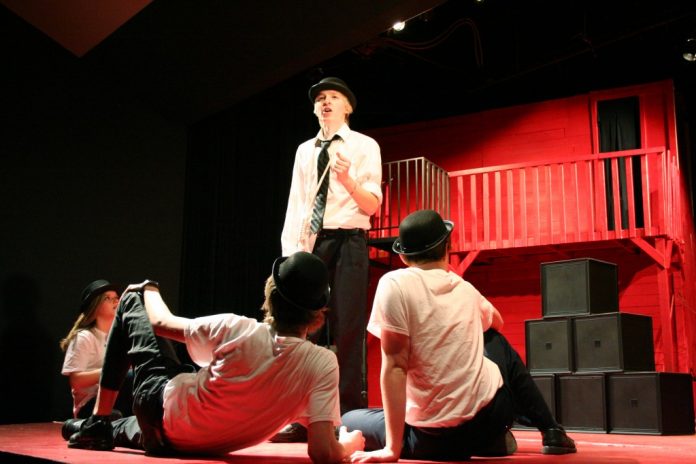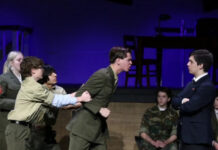In their promotional video, Jesuit’s Winter One Acts directors act out a battle royale between the two directing troupes that took the stage in last week’s performances. “Prepare to be upstaged,” warns director Colin Taylor ’12. “Winner take all, theater rules apply,” retorts fellow director David Smith ’12. As both sides dig in to their positions and prepare to fight, Omeed Azmoudeh ’12 breaks the silence with a bold claim: “I play sports and do theater: the perfect trifecta [wink].”
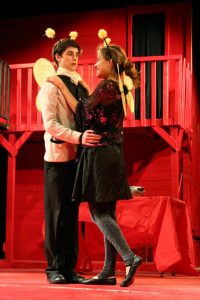
As the promo video suggests, Jesuit’s Winter One Acts, which ran from January 11-14, 2012, showcased the comedic skills of the theater department. Jesuit seniors directed the collection of nine short comedies, highlighting what they learned in David Myers’ theater direction class.
The One Acts are a favorite among students. “This is my fourth year to participate in one acts,” says Connor Beach ’12. “Ever since I was a wee lad, I’ve always wanted to direct. We’ve learned a lot and really enjoyed ourselves.” When asked to sum up his experience with the One Acts, Beach responded, “I love it!”
The four performance dates were divvied up between two directing troupes, with each troupe performing two 7:00 p.m. shows over a four-day span. On Wednesday and Friday (January 11 and 13), senior directors Connor Beach, Omeed Azmoudeh, Noah Barron, and Ben Cordell ran the show. On Thursday and Saturday, the stacked directing lineup included Jake Greenwood, Matt Williams, Jacob Khoury, David Smith, Mark Diaz-Arrastia, Jack Blais, Colin Taylor, Garrett King, Forrest Smith, Frankie Guidone, and Dylan Stone.
The Roundup sent seasoned journalists Will Wood ’13 and Clark Durham ’12 to catch the Wednesday and Saturday shows. Below are their reviews.
Night One (Coverage by Clark Durham)
On January 11, 2012, the Jesuit Winter One Acts premiered in a 7:00 p.m. show in the Lecture Hall. The show began with around 150 people in the audience; as the night went on and more trickled in, that number swelled to nearly 200, with open seats few and far between in the Lecture Hall. As the jovial play programs and blindingly red stage suggested, absurdity was king in the four performances, with out-of-place characters and sidesplitting one-liners behind every corner.
The first show, “A Blue Moon Over Memphis,” depicted a lonely woman’s cosmic meeting with the late 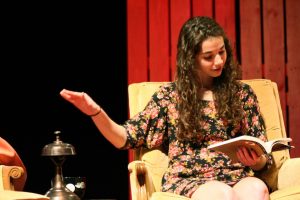 Elvis Presley. Thomas Spottiswood ’14, his scalp copiously covered with mousse, put on his best Southern accent as The King, earning intermittent laughter from the student section. Ryan Adams ’13 took on the minor though hilarious role of a janitor with an affection for one-liners. But the actor who really stole the show was Ursuline’s Natalia Gonzales, who played the lead role of Judy. Her appropriately saccharine Tennessee accent melted the crowd, and her stage presence was strong throughout.
Elvis Presley. Thomas Spottiswood ’14, his scalp copiously covered with mousse, put on his best Southern accent as The King, earning intermittent laughter from the student section. Ryan Adams ’13 took on the minor though hilarious role of a janitor with an affection for one-liners. But the actor who really stole the show was Ursuline’s Natalia Gonzales, who played the lead role of Judy. Her appropriately saccharine Tennessee accent melted the crowd, and her stage presence was strong throughout.
After a short re-grouping break, Shane McGoldrick ’13 and Katie Frisbee took the stage for their rendition of “Sure Thing,” a show that explored the trials and tribulations of flirting with strangers. What the show lacked in plot depth it made up for in strong dialogue, as the awkward exchanges of McGoldrick and Frisbee won frequent bouts of laughter from the audience.
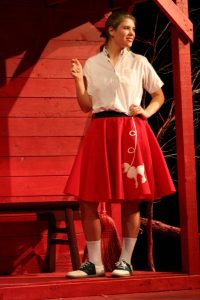 The third show, “The Actor’s Nightmare,” was an unabashed exercise in absurdity directed by the goofy directing tandem of Connor Beach and Omeed Azmoudeh. Junior Basil Seif starred as the wonderfully befuddled lead actor in the play within a play, feigning ignorance of his role throughout. The show was marked by extremely competent acting from the cast, including the hilariously dramatic Joey Kishpaugh ’12 and senior Aaron Walters’ breakout performance as a lamp. “Coming up into this week, we had a really hard time,” said Azmoudeh after the play. “But it all seemed to come together tonight, and boy did it look good out there.”
The third show, “The Actor’s Nightmare,” was an unabashed exercise in absurdity directed by the goofy directing tandem of Connor Beach and Omeed Azmoudeh. Junior Basil Seif starred as the wonderfully befuddled lead actor in the play within a play, feigning ignorance of his role throughout. The show was marked by extremely competent acting from the cast, including the hilariously dramatic Joey Kishpaugh ’12 and senior Aaron Walters’ breakout performance as a lamp. “Coming up into this week, we had a really hard time,” said Azmoudeh after the play. “But it all seemed to come together tonight, and boy did it look good out there.”
The One Acts closed with another two-man show featuring Michael Andro ’12 and Mary Ehrlicher. The two played art enthusiasts who meet at a museum and bond over a certain Tornay painting. While they seem to be kindred spirits at first, they quickly find out that their interpretations of the painting, and their political views, vary greatly. The performance ends with the real Tornay, played masterfully by Sabrina Miranda, flipping the painting upside down to reveal a face (much to the chagrin of Andro and Ehrlicher).
Night Four (Coverage by Will Wood)
On Saturday, January 14, 2012, I had the opportunity to catch the Jesuit Winter One Acts. As the lights fell down on the packed Lecture Hall, the audience quieted themselves for the performances.
The first act, ironically titled “A Play on Words,” was performed by Alex Pestos ’12, Celeste Galey, and Durgan Koch ’12. Seniors Jack Greenwood, Catherin Brandt, and Matthew Williams directed the show. The show started with Pestos, a suave young man combing his hair, approaching his eager mistress, played by Galey, on what appears to be a first date. Petsos would constantly try to impress her, asking seemingly normal first date questions and trying to flaunt his masculinity by showing off his triceps. The true hilarity was not in any of the superfluous arrogance Alex portrayed, but in the dialog and quick retorts between the two players. These two had a pun of some sort in almost every single line; at one point, Petsos asked Galey if she liked music, to which she responded “Yes, you too?” “No I’m not a fan of Bono,” retorted Petsos. “It got to the point where it was hard [for the actors] to keep a straight face,” said Basil Seif ’13.
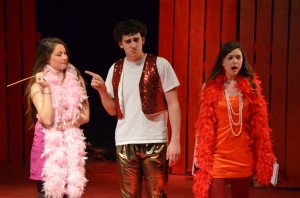
The next show, titled “Waiting for Godot, An Absurdist Play by Samuel Beckett,” was an incomprehensible oddity. This quirky play was written by Jacob Khoury ’12 and David Smith ’12 and performed by Laura Ross, Griffin Miler ’13, Eric Bradely ’13, and Brian Eisele ’14. Three of the players donned black pants and white tee-shirts spray painted with letters, and the last player had a noose around his neck while wearing a plain white shirt and black pants. From there, it’s hard to conceive what happened. The audience isn’t given a background or led to understand where we are or the premise of the play, other than the fact that two of the characters know each other and the other two do not. Later we find that Miller, the boy with the noose, is the pet of Ross and that he can do a dance number for some reason. When Griffin described the future or other common philosophical questions, the other three players sat around him and commented. What this noticeably long play lacked in common sense it made up for with artistic value
This was followed by the show “Self Defense by Fresh Fruit.” The play was written by Colin Taylor ’12, Jack Blais ’12, and Mark Diaz- Arrastia ’12 and performed by Harrison Ainsworth’12, Eric Nunez-Lafontaine’12, Grace Cunningham, Ryan Diller ’13, Emilio Lopez ’14, and Matthew Bedard ’14.The scene was set in a self defense class taught by Ainsworth’s character, complete with a believable French accent. The four students in the class expected to learn self-defense from deadly weapons, but the teacher showed them instead how to defend themselves from a person armed with fruit. He told one student to come at him with a banana, and then he shoots her, takes the banana, and eats it. The other students are horrified and criticize him for not actually teaching the students anything. As the play went on, the teacher used cheap tricks and his minion to kill the rest of the class. This final scene “made everyone laugh,” said Tanner Pochman, a senior at Parish Episcopal School. The slapstick humor was well executed and the show was a crowd favorite.
A science fiction twist came in the fourth One Act, “The Philadelphia,” performed by Alex Curry ’14, Rose Massas, and John Jackson ’14. Curry and Jackson sit down at a restaurant waiting to be served by their waitress, Mannas, and while they wait Jackson explains to Curry what a horrible day he has had. He explains the toils of his long day, eventually freaking out. Curry tells Johnson later that Johnson must be living in a Philadelphia, a place where everything is awful and you can’t get what you want and that he is living in a Los Angeles, a place where you can’t be sad. Later Curry finds that he has been sucked into the Philadelphia by Johnson and the play ends in a fit of rage. This unique take on dealing with issues in our lives leaves a memorable comedy experience in the minds of the audience, well done.
The final one act of the night, “Time Flies,” was a seductive romantic comedy set in a swamp where two mayflies, portrayed by McKenna Wierman and Colin Traver ’13, come home from a date and spend the remainder of their 24-hour lifespans together. The two flies seemed to be very into each other, as several sexual innuendos are said and bottles of wine are opened. This all comes to a halt when Chandler Park, playing a bull frog, pulls a gun out and tries to shoot Chris Hurley ’12, a firefly who doubles as a butler. The couple decides to take it slow and watch some TV, where they find they are being filmed by a British insect enthusiast on the nature channel. The two start going over the remainder of their short lives, and they decide they want to go to Paris. This short ends with the two starting to fly off into the sunset, headed for Paris, when they suddenly die. I found this to be a very cute romantic comedy. “That was a good way to end it,” said Seif and Pochman.


